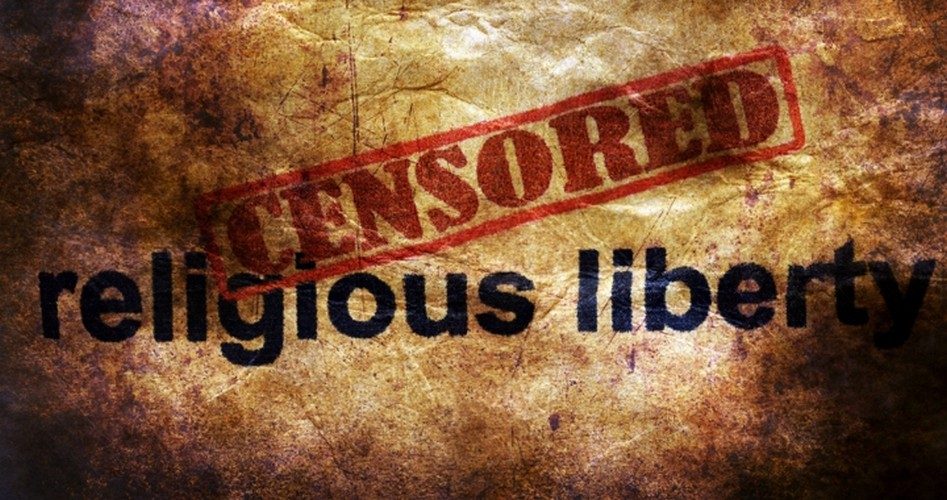
It’s often said “Our strength lies in our diversity.” But greater diversity in “religion” — namely, Islam’s new prominence in Sweden — is leading to calls in that nation to outlaw all religious schools.
The proposal was made ahead of an election by the ruling Social Democratic party, which says it’s concerned about ending “sex segregation” in the country. Unsurprisingly, the idea “follows reports of gender segregation in some Muslim free schools,” reports the Daily Mail. Note, all the relevant religious schools in Sweden are “free” — funded by the government — because it’s illegal there to charge minors under 18 for primary or secondary education.
Interestingly, the proposal includes an exception for Jewish schools but not Christian ones. There are 59 of the latter, one religious Jewish school and several other “secular Jewish” institutions.
One can easily surmise what motivates this discrimination. First, Sweden is the world’s least religious Western nation, with 76 percent of the population claiming to be either “not religious” or “atheist” and only five percent being regular churchgoers (mosque attendance is growing, though). Sweden also opened an “atheist cemetery” in 2016. (One should wonder why it isn’t a fertilizer factory. Romanticizing death? The departed are just worm food, atheists tell us.)
As elsewhere in the West, this atheism correlates with Christophobia; this manifests itself in many ways in Sweden, one of which is a popular brand of jeans bearing an anti-Christian logo described by its designer as “an active statement against Christianity.”
Second, the discrimination is reminiscent of how the U.K.’s government banned radio host Michael Savage from Britain in order to, it was ultimately revealed, balance out the Muslims on the ban list. The über-politically correct Swedish government would fear being perceived as “racist” (even though “Muslim” isn’t a race) — an unpardonable Scandinavian sin — by singling out the schools actually practicing the unfashionable segregation: the Muslim ones. It needs to persecute the few remaining Christians for cover.
Lastly, the issue provides secular, statist Sweden a handy pretext for eliminating competition and ushering virtually all children into government indoctrination centers.
This is not a fait accompli, however, as the religious-school ban hasn’t yet been passed by the Swedish parliament. But it has support from other parties, the Mail informs, as unfashionable sex segregation is another Scandinavian sin.
Of course, there hasn’t ever been a civilization that didn’t have two different standards for the two different sexes, and it’s hard to find anyone who doesn’t believe in sex segregation. Should we eliminate separate bathrooms, locker facilities and sports categories for the sexes, for instance? Should women be subject to military conscription, just as men are? A mature, intellectual debate wouldn’t simply demonize “sex segregation” — it would tackle what exact form that segregation should take.
But depth doesn’t characterize our modern controversies. For example, Iranian-descent politician Ardalan Shekarabi, Sweden’s minister for Public Administration, “said that ‘teachers, not priests and imams should be in charge of schools,’” the Mail tells us.
Of course, the designation “teacher” references a general category and relates nothing about world view or what’s taught. Priests can be and have been teachers; in fact, priests attend college as well as seminary (and some have Ph.D.’s) and often have degrees in so-called non-religious fields.
Moreover, actual, real-live teachers do have world views — just like priests. They bring to the class dogmas; relate moral principles (or preferences) by design and unintentionally; and indoctrinate with certain ideas. A “value free” education does not exist (a virtually virtue-free one can, though).
Delving even deeper, as I warned years ago, the Swedish proposal reflects one of the dangers of embracing religious-equivalence doctrine, of lumping every faith together in the category “religion”: Discredit one and you discredit all.
Religious-equivalence doctrine (RED) is a philosophical mistake characteristic of our time. You may hear, “Religion is dangerous” or “Religion is this or that”; this makes as much sense as saying “Ideology is dangerous.” For like ideology, religion is not a creed but a category. It includes everything from the good to the bad to the ugly.
Part of the impetus behind RED’s embrace is the desire to get along in a multi-faith society. We don’t want to be like two boys in the schoolyard saying, “My daddy [faith] can beat up your daddy!” So we just agree that all daddies’ fists are equal. Then we don’t fight over “religion,” not at all. We kick the can down the road.
We fight over ideology.
It’s all quite illogical. RED is a corollary of moral relativism, the mistaken notion that all “values” are morally equal. After all, since different faiths espouse different values, all faiths can only be morally equal if all values are. If this is so, however, then all ideologies would have to be equal, too. For what distinguishes them is also that they espouse different values.
If we applied the same standard to ideology as we do to religion — treating it as a creed and not a category — we’d let the existence of Nazism and Marxism discredit all ideology — while carving out politically correct exceptions. Such irrationality reigns when people operate on emotion, and emotion reigns when people cease governing themselves with Truth.
Of course, there can be a category bad by definition: “Things That are Bad.” This brings us to the point: People are creatures who believe things. And whatever we label those things — secular, religious, fun, stifling, hygienic, dirty, etc. — all that matters is that some of those things are good and some of those things are bad.
We won’t discern which are which, however, when we blind ourselves with a “Four legs good, two legs bad” mentality. Saying “This is secular, so it can be in schools; this is religious, so it cannot be” makes as much sense as saying of ingestion, “This is green, so it can be eaten; this is orange, so it cannot be.”
“Government” also is a category — not something reflective of a creed. Assuming its actions and educational schemes are always valid makes as much sense as eating toxic algae because it’s green.
Photo: alexskopje/iStock/Getty Images Plus



